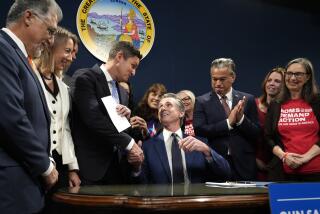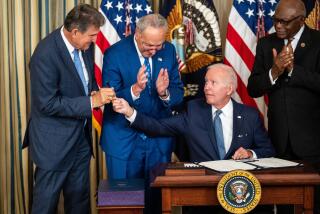President Signs Tax Reform Act Changes : Law Includes ‘Taxpayers’ Bill of Rights,’ Seizure of Site Near Civil War Battlefield
- Share via
WASHINGTON — President Reagan today signed legislation making several refinements in the landmark tax overhaul of 1986 and providing a “bill of rights” for U.S. taxpayers.
Although White House officials had said they had qualms about the legislation, particularly in connection with a $50-million federal seizure of property next to historic Civil War battlefields in northern Virginia, the terse announcement of Reagan’s approval carried no statement of presidential misgivings.
The “Tax Corrections Act” was one of few remaining pieces of legislation from the last Congress Reagan had not disposed of. Among the bills he must still act upon is legislation stepping up the U.S. effort to curb drug abuse.
The bill originally was designed to clear up confusing language and correct errors in the tax overhaul enacted in 1986. But the new legislation was amended repeatedly to extend some expiring benefits, add some new ones for selected groups and raise taxes to finance the benefits.
The measure would have no effect on the federal deficit. Although it would cut taxes by $4.1 billion over three years, it would raise others by the same amount.
Reins Put on IRS
The bill also includes a “taxpayers’ bill of rights” to rein in what some lawmakers view as an overly aggressive Internal Revenue Service. For example, the agency would have to give 30 days’ notice before seizing bank accounts and other property, and would be prohibited from promoting employees on the basis of how much they collect from taxpayers.
A major non-tax provision seizes nearly 600 acres of land adjacent to the Manassas Battlefield in northern Virginia to block construction of a shopping mall on the site.
George Berklacy, a spokesman for the National Park Service, said today that, while Interior Department officials disagreed with the strategy of protecting the battlefield exclusively through a so-called “legislative taking,” Interior Secretary Donald P. Hodel concluded there should be no “concerted effort by the Interior Department to urge a presidential veto.”
The legislation, more than two years in the making, includes tax relief for farmers, free-lance writers, owners of mutual funds, recipients of employer-financed tuition, and a variety of other interests. It also includes selected tax increases to pay for those benefits.
Educational Exceptions
Also accepted by negotiators was a Senate provision allowing families to avoid tax on interest earned on U.S. savings bonds that are redeemed to finance a college or vocational education.
Most of the pressure for passage of the bill came from farmers. They will benefit in two ways, winning exemption from paying the federal tax on diesel fuel and authority to deduct some expenses of producing livestock even before the animals begin generating income.
Pressure also came from accountants and other tax professionals, who are seeking corrections for hundreds of errors and ambiguities in the big tax overhaul enacted in 1986. The original purpose of the bill was to repair those errors.
More to Read
Sign up for Essential California
The most important California stories and recommendations in your inbox every morning.
You may occasionally receive promotional content from the Los Angeles Times.










